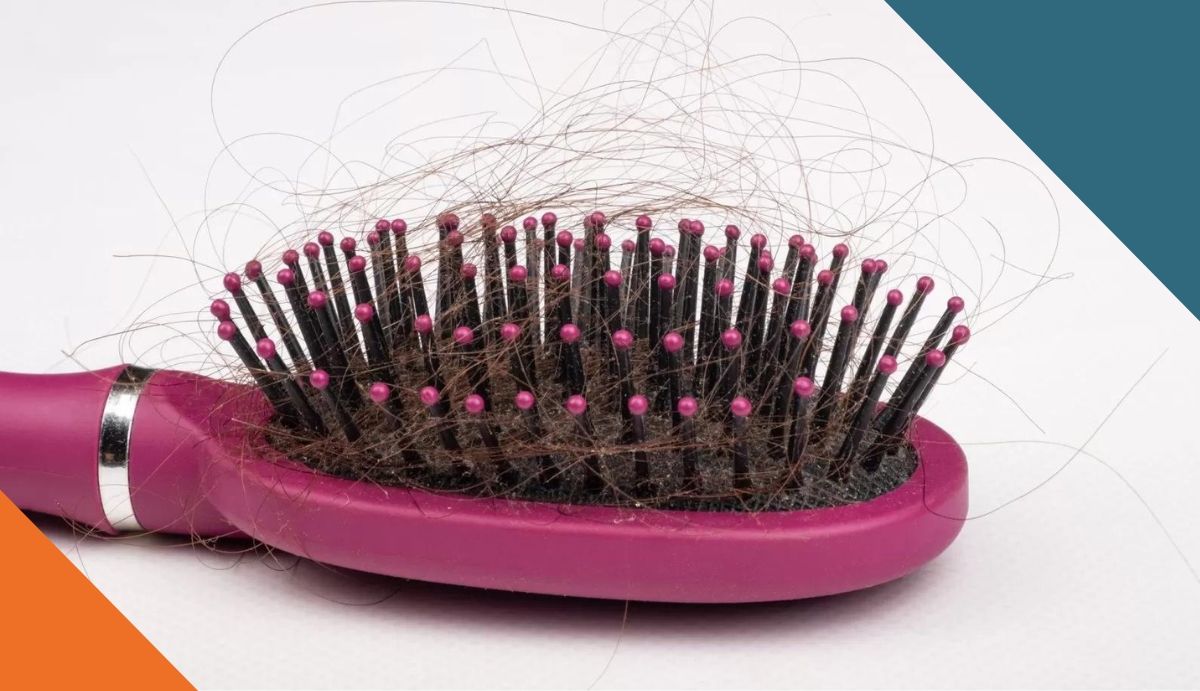Menopausal Hair Loss
15 March 2021

When it comes to discussing menopause, most people are aware of the common symptoms and side effects such as hot flushes and night sweats, but many people are unaware that hair loss can also be a factor.
Hair loss can be a common side effect experienced by women who have reached the menopause. Hair loss can make many women feel self-conscious about their physical appearance and hurt their confidence levels. In this article we discuss all things menopausal hair loss, why it happens and what you can do to help reduce it.
What is the menopause?
The menopause is a natural, biological process that is experienced by all women at some point in their lives, usually this occurs between the ages of 45 – 55 but can be earlier or later. The onset of menopause occurs due to hormone changes in the body, the ovaries will stop producing as much of the oestrogen hormone and will no longer release an egg every month.
The body goes through many physical changes during this time due to a fluctuation in hormone levels. Many women will experience symptoms such as hot flushes, weight gain, night sweats, insomnia and mood swings. Another common symptom that is perhaps less spoken about is loss of hair.
What causes hair loss during the menopause?
Most forms of hair loss can be attributed to hormonal changes, this is also the case in terms of the menopause. Menopausal hair loss is specifically associated with a lowered production of oestrogen and progesterone. These hormones are important for helping hair to grow faster and also stay on the head for longer! A decrease in these hormones can also trigger an increase in the production of a group of male hormones or androgens. Androgens shrink hair follicles which can result in the loss of hair on the head. With menopausal hormone imbalances, hair can become much thinner, grow at a slower pace than before and also fall out.
How to spot hair loss
Many women will start to notice that their hair is thinning at this time in their lives and this can be a cause for concern or embarrassment. Hair loss in women tends to be a lot less noticeable than it is in men, in most cases, women tend to experience overall hair thinning rather than noticeable, large bald spots. The first signs of hair loss can normally be seen occurring around the hairline, ‘widow’s peak’ or also on top of the head. Some women may also notice that they are losing large amounts of hair whilst carrying out tasks such as brushing or washing their hair.
Hair loss during menopause can almost always be attributed to hormone imbalances, however, many other factors may be contributing to hair loss. These include lack of certain nutrients, extreme stress and in some cases an underlying medical condition such as thyroid issues. It is important to determine the cause of your hair loss so you can choose the best treatment. Diagnostic blood tests can be carried out to rule out any other potential causes of your hair loss and test for any underlying health concerns.
Maintaining healthy hair during the menopause
Although menopausal hair loss cannot be prevented, there are steps you can take to ensure you are giving your hair the best possible treatment.
Reduce stress
Reduced levels of hormone production can affect your brain chemistry, this, in turn, can mean that you are more prone to mood swings, anxiety and depression. It is important to keep a check on your stress levels during the menopause. Activities such as yoga, exercise or creating artwork have all been shown to reduce stress levels.
Eating a balanced diet
It is important for anyone to eat a balanced diet but when it comes to combating hair loss, eating the correct foods can have a major impact. Ensure that you are eating low-fat, varied meals and make sure to include adequate amounts of fruits, vegetables and grains in every meal. Essential fatty acids found in food such as tuna, salmon, walnuts and almonds also play a crucial role in maintaining health. It may also be beneficial to take vitamin B6 or folic acid supplements to assist with the restoration of hair growth. Remember to always consult a medical professional before taking any new supplements.
Avoiding heat and certain hairstyles
Heat styling, hair dye and hair extensions are best to be avoided when suffering with hair loss. Heat styling is known to contribute to the breakage and drying out of the hair, leaving hair to dry naturally is your best bet to avoid this. The same can be said for hair dye. The dye often contains harsh chemicals that can irritate the scalp and cause further damage. If you are going to dye your hair, it is best to stick with an all-natural colour to avoid the chemicals associated with other hair colours and dyes.
It may be tempting to wear hair extensions to give the look of fullness to your hair, but extensions can cause early hair loss and do more harm than good.
If you are worried about the appearance of your hair why not check out our hair systems for women? All of our hairpieces are custom-made to fit your needs, putting you back in control of your hair.
At Optima, we understand that hair loss can be a sensitive subject and one that is often met with embarrassment however it is important to remember that the menopause is a natural process of life and one that cannot be avoided!
If you are concerned about your hair loss why not book a free consultation with us today to start your journey and regain confidence in your hair?
